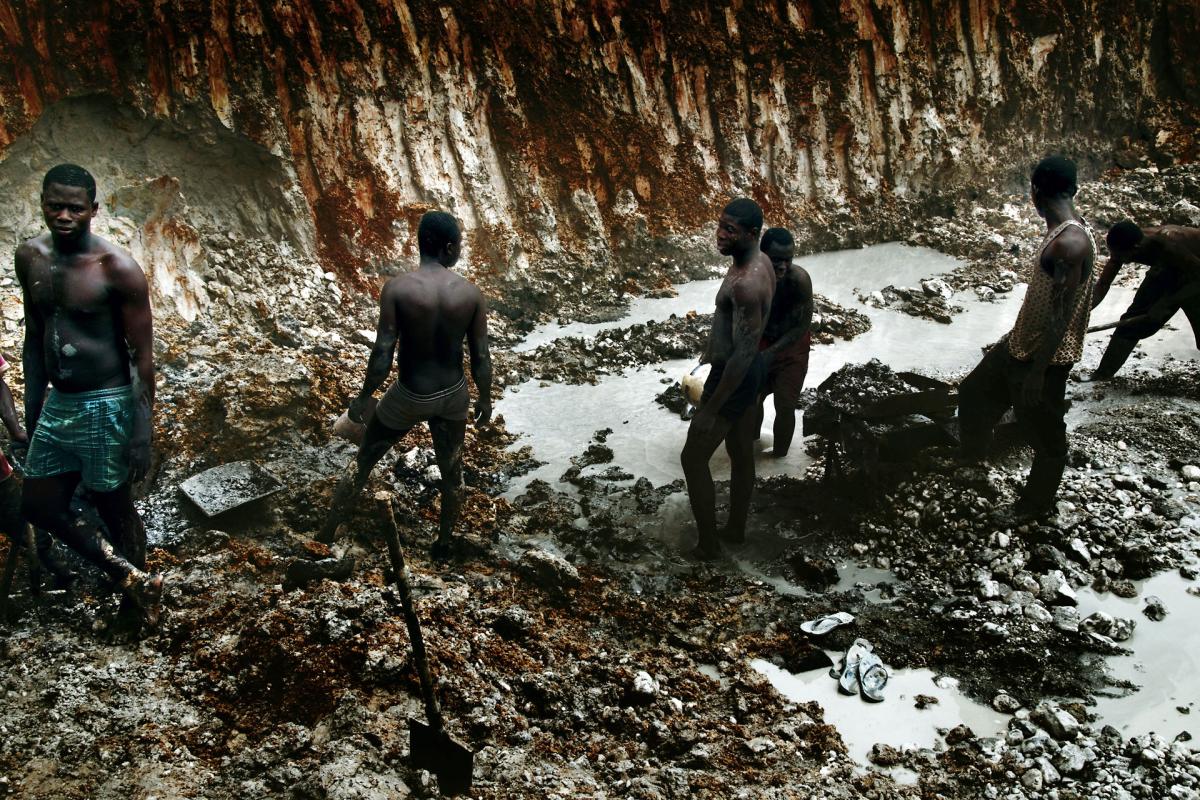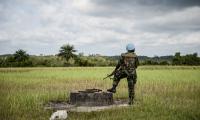
Mining, gender and ‘kolikoli’: Marginalisation of women or empowerment in the margins?
Illegal mining is a major source of conflict in Ghana. On a research trip to the town of Kyeby in the eastern region of the country, researcher Pius Siakwah from the University of Ghana explored the conditions of women in this otherwise male-dominated sphere. Here he found that women still work in the margins of the profession, leaving them both financially and socially vulnerable. This is a peek into one of the sites of fieldwork of the programme Domestic Security Implications of Peacekeeping in Ghana (D-SIP).
I have always been interested in natural resources governance, particularly with respect to how developing countries and local communities have benefited less from these resources than mining companies. In Kyebi, however, the issue of gender became more interesting to me as I listened to a social worker in the municipal assembly narrating how women are sometimes roped into illegal mining in the area, albeit marginally due to their role and status in the mining space.
Illegal mining is mostly seen as a male affair, and therefore women’s place in the industry and its impact on their livelihoods receive very little research or policy attention. What literature exists has highlighted the limited role of women in the sector and its seriously negative implications for livelihoods. As part of the research team exploring community conflicts in Ghana, I came face-to-face with complex realities of gender, chieftaincy, farming, mining, resources control, vulnerability, inequality, and conflict. It emerged just how complex the position of women is in the extractive industry.
This left me with a question: does ‘kolikoli’ reinforce the marginality of women in the extractive industry or offer them an opportunity for empowerment and reassertion of their status in a hostile terrain?
In the mining town of Kyebi in the Eastern Region of Ghana, the practice of ‘kolikoli’ highlights women’s role in gold extraction. ‘Kolikoli’ (small small) in the local parlance denotes situations where the women wash the left-over soil in efforts to extract what little gold is left. This left me with a question: does ‘kolikoli’ reinforce the marginality of women in the extractive industry or offer them an opportunity for empowerment and reassertion of their status in a hostile terrain?
Mining has a long history in Ghana and has mostly been dominated by men. Neoliberal policies that expanded large scale mining in the 1990s further increased the vulnerability of women. Gender has been the missing link in the analysis of illegal small-scale gold mining or so-called ‘galamsey’ mining. Not much is known about what roles men and women play in the mining setting or how the various genders are embedded or incorporated in the ‘galamsey’ space.
Awumbila and Tsikata have explored how, in north-eastern Ghana, gold mining resulted in the modification and creation of social identities in the struggle over resources. However, while mining offered some transformative prospects, they rarely translated into changed gender identities for women since they are still governed by social norms and poor access to resources that exacerbate insecurities and inequalities. A survey in the 1990s found that women constituted some 15% of the legalised segment of Ghana’s small-scale mining labour force. They account for 6% of the licensed buyers, 10% of concession holders, and 15–20% of the sponsors of mining working groups. Historically, Ghana’s mining sector, and more recently the hydrocarbon industry, has been criticised for the limited opportunities it gives to women. Women are employed in the lower echelons of the sector such as cooking and cleaning. In gold mining, menstruation is associated with bad luck that inhibits locating more gold. This reinforces gender ideologies regarding appropriate work.
The main economic activities in the Kyebi area are mining, farming, and trading in goods and services. Based on the information from my fieldwork, mining was introduced to Kyebi by people from Akwatia – an adjoining town noted for bauxite mining. There are seven main companies currently mining in the area, who sometimes sublet some of their operations to ‘galamsey’ operators. Although farming has been prominent in the community, ‘galamsey’ is taking over the space and there are mining activities in farms, forest reserves and even on the compound of schools such as Abuakwa State College, and the School of Deaf and Blind. More horrifying, surface mining ‘galamsey’ activities have destroyed water bodies, with serious implications for drinking water locally and Ghana in general. Locals, indigenes, persons from other parts of Ghana and more recently, Chinese citizens have been engaged in mining in Kyebi, and there are blame games between the traditional authorities and the municipal assembly over how to govern ‘galamsey’ activities.
In Ghana, there are three types of mining; large-scale mining often carried out by transnational companies, small-scale mining undertaken by legally registered local companies, and ‘galamsey’ (illegal mining). Despite existing legal frameworks that regulate small scale mining, most of the operatives in this space are operating illegally. These ‘galamsey’ miners have failed to register with the relevant government institutions, specifically the Mineral Commission, and sometimes operate in concessions of large-scale mining companies without a permit or on their own land and land provided by chiefs. Both legal and illegal mining activities have polluted water bodies, and degraded environments, with implications for sustainability of the ecosystem and local livelihoods.
How ‘kolikoli’ operates at Kyebi raises two important issues: first, the marginality of women in the extractive industry is reinforced in the ‘galamsey’ space; and second, but most importantly, even within the constraints and challenges of the hostile mining space, women navigate this male dominated economic activity and create new opportunities to assert their agency. Although these activities can be viewed as disempowering, because women only take part on the margins of the ‘galamsey’ space, they can also be analysed as opening new opportunities for women in mining, and assist in removing some of the taboos associated with women as bad luck for mining. In Tarkwa, which is also a mining community in the Western Region of Ghana, women are equally engaged in small scale mining, but it is limited as more transnational companies control the concessions in the area.
In Kyebi, because the women only participate marginally in the ‘galamsey’ as ‘kolikoli’ operators, their earnings are much lower than those of the men. However, they are often better off than those women who work outside the sector, who often rely on the men in the mining sector for their livelihoods. Young girls are sometimes lured into sexual relationships with men in the mining sector, often leading to teenage pregnancy and its attendant challenges. We noted during the fieldwork that some of the men deny responsibility for the pregnancies. The Social Welfare Department of the municipal assembly in the area had to mediate in such cases. Sometimes, the litigation is only settled when DNA tests are conducted to determine the paternity of some of the children. Where tests prove positive, the department ensures that a maintenance allowance is paid accordingly to the mother and child. There are also instances where the women are left alone to single-handedly cater for the children, thus putting financial and social pressures on them.
There is a hierarchy of actors or classes in the ‘galamsey’ industry. We have the ‘sponsor’, ‘operator’, ‘gang leader’, and the ‘gang’. The sponsors buy the concessions while the operators are responsible for operating the machines for washing the gold. The gang leader leads the other workers, mostly women, to fetch the sand into the machine for washing. Analysing the hierarchy, the ‘kolikoli’ group is barely mentioned in the scheme of things. This highlights the obscure position of women in the operation of ‘galamsey’ mines.
Women are at the centre of domestic activities, but they are more vulnerable to poor wages and income, and the risk of desertion by men who fail to take care of the children
Women’s role is not recognised properly despite some of them doing some of the hardest work, such as fetching water. The women, who are located in the lower echelon of the ‘galamsey’ chain, come in to clear the leftovers after the men have made money in the mining space. Structural adjustment policies are criticised for perpetuating poverty within Ghana’s subsistence economy by fuelling both the uncontrolled growth of informality, poverty-driven artisanal gold mining and marginalisation of impoverished participants, especially women. Moreover, large-scale mining has led to the displacement of small-scale miners, and re-marginalisation of the poor and vulnerable.
As some of the stories in the Kyebi area demonstrate, men dominate the sector, and women are only engaged marginally, which reinforces their vulnerability within the mining enclaves. Women and children need special attention because of their roles/positions in society and the mining space. Women are at the centre of domestic activities, but they are more vulnerable to poor wages and income, and the risk of desertion by men who fail to take care of the children. If the mining operations are gender-sensitive, the women can equally participate in the sector and earn enough money to cater for their socio-economic needs without being dominated by men.
About the author
Pius Siakwah, PhD is an emerging development geographer and researcher, with a special interest in relationships, interactions, and linkages between natural/energy resources and livelihoods, and sustainable development in Africa among others. Currently he is a Research Fellow at the Institute of African Studies at the University of Ghana and part of the research project D-SIP – Domestic Security Implications of UN Peacekeeping in Ghana.

